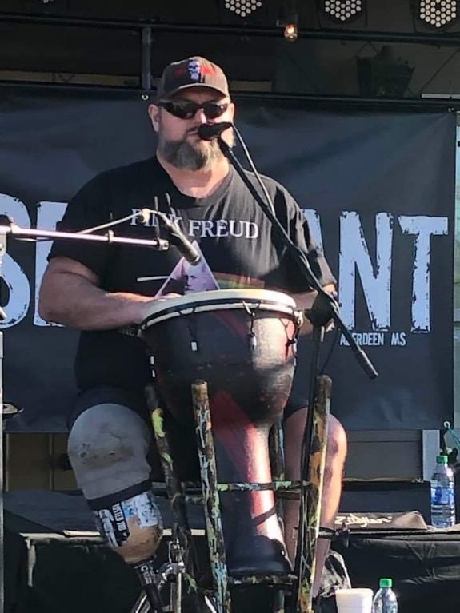Mississippi Today
How Medicaid expansion could have saved Tim’s leg — and changed his life
How Medicaid expansion could have saved Tim's leg — and changed his life
Note: This article is part of Mississippi Today's ongoing Mississippi Health Care Crisis project. Read more about the project by clicking here.
Tim Floyd has never been one to sit still.
After being forced to leave community college to move home to Guntown to help his mom pay the bills, he landed a job driving a truck in his early 20s. But three or four years later, he was diagnosed with sleep apnea, a dangerous condition for professional drivers because it can lead to fatigue and slow reactions when driving. Just like that, his truck driving career was over.
The health insurance that job had provided him abruptly disappeared — and his life has never been the same since.
“It made me no longer insurable to drive the truck, and that's what led me down the path of not being able to find a job with health insurance and not being able to afford (private) insurance with the jobs I had,” said Floyd, now 46 years old.
Since then, Floyd has been trapped in what is called the "health insurance gap": he doesn't qualify for Mississippi's strict and limited Medicaid program, and he doesn't have private health insurance from an employer. He can't afford a private plan himself.
Meanwhile, over the past five years, Floyd's serious health problems have mounted. He's been diagnosed with diabetes. He's lost part of his leg. He's battled cancer. He told Mississippi Today he's sure he has medical debt, but he tries not to think about it: the past few years have just been about surviving each day.
Floyd's conundrum is not unique in Mississippi. The state leads the nation in both rates of poverty and of uninsured people. Mississippi remains one of 12 states – and will likely soon be one of only 10 – not to accept federal dollars and provide health insurance to hundreds of thousands of Mississippians, many of them working poor.
Studies, including one from the state economist, have shown expanding Medicaid would cover up to about 230,000 Mississippians making up to 138% of the federal poverty level, or about $30,000 in annual income for a family of three. Floyd would have been covered under expanded Medicaid during the years he worked as a cashier and other low wage jobs, but because Mississippi never expanded, he wasn't.
The study also showed the state would save anywhere from $186 million to $207 million from 2022 through 2027 and create thousands of jobs.
Medicaid expansion has also been associated with reductions in mortality in addition to declines in medical debt, which is highest in the South and in lower-income communities.
But both Speaker of the House Philip Gunn and Gov. Tate Reeves remain unwaveringly opposed to expansion.
“Extending Medicaid to people who can't afford health insurance would offer them and their families basic financial security to live a healthy life, that includes preventative care. Mississippians shouldn't face financial ruin if they need health care or worry that a lack of preventative health care could cost them their lives,” said Roy Mitchell, executive director of the Mississippi Health Advocacy Program.
After he lost the trucking job, Floyd then worked many other jobs – including multiple at one time – but never landed another that offered health insurance.
The combination of jobs wasn't enough to afford private insurance or pay out-of-pocket medical costs. So he remained uninsured and stopped going to the doctor.
Six in 10 uninsured adults say they have postponed getting health care they needed due to cost, according to KFF. Uninsured adults are also more likely to report skipping recommended tests or treatment due to cost than adults with insurance.
In 2012, that practice caught up to Floyd. He was working a construction job when a rock got stuck under his foot inside his boot and created a sore. He put some antibiotic ointment and a Bandaid on it and continued working. But six months later, the sore became infected and his foot swelled up. He used savings to go see a doctor, who referred him to a wound specialist.
For the next five years, he battled that sore: he would treat it and stay off his feet for a month (which would sometimes cause him to lose whatever job he had at the time), the sore would heal, and he would go back to work. Then the whole cycle repeated again.
In 2017, a doctor suggested he have his blood sugar tested. So Floyd, again, dipped into his savings for a basic appointment and test. The results showed he was diabetic, and the sores were diabetic foot ulcers. The infection was now in his bones.
There was only one option at that point: amputate his leg from the knee down. So again, just like that, his life changed. The charity program at North Mississippi Medical Center where he received his care covered the costs of the surgery, he said. Six months later, he was fitted for a prosthetic and began the process of rebuilding his strength and relearning how to do the things dear to him: basic things like walk, take care of the family's dog, play the drums.
“It was hard. It was hard not only on me but on the people that cared about me,” he said. “Also, my emotional health wasn't all that great … It took me about another year (after getting the prosthetic) to be able to walk unassisted – no cane or walker or nothing. Then, just building – going from being pretty active to being very sedentary to trying to get active again took me another year from that before I got my stamina back up to where I could work.”
Tim Floyd, left, listens as his father, Macky Floyd, plays the guitar at their home in Guntown, Miss., Friday, Nov. 4, 2022.
The Tupelo hospital – a hub for health care and employment in north Mississippi – offers a financial assistance program for uninsured and underinsured patients like Floyd who need emergency or medically necessary care. The hospital and its subsidiaries spent over $190 million in fiscal year 2021 in charity care and uninsured discounts.
The hospital is situated in the district of Sen. Chad McMahan, a Republican who also lives in Floyd's same small hometown of Guntown. McMahan drew criticism from Republican counterparts in 2021 when he indicated he was willing to discuss Medicaid expansion “and look at what (it) might look like.”
Today, he still maintains he sympathizes with people who work but are uninsured. He says he's not for Medicaid expansion, per se, but does believe it should be discussed and that the health care system in Mississippi needs to be reformed.
“I think everything has to be on the table – whether or not we're going to have Medicaid enhancements or Medicaid expansion or if we're going to have a modernization of the way prices, menu prices, are put out from hospitals,” or how insurance companies operate, he said.
McMahan said he regularly speaks with administrators at the hospital that employs nearly 9,000 people.
“For the hospital system I represent, they have annual salaries of half a billion a year and then an annual income revenue stream of 1 billion-plus. Last year, they gave away 19% in charity,” he said. “… It's unsustainable. In what other business can you give away 19% (and survive)?”
Beyond the economics of Medicaid expansion and health care reform, McMahan, who grew up without health insurance as the son of a carpenter and a clerk, says he feels for Floyd and identifies with him.
“In the 9th grade I got hurt, and my parents didn't have insurance … I remember seeing the fear in my family's eyes and hearing discussions at the dinner table when my parents would be discussing what we were going to eliminate from the family budget that month to pay for the $20,000 hospital bill I had,” he said.
“I'm sympathetic to him (Floyd) because I was like that myself … If we're going to do any type of Medicaid overhaul, there has to be a work requirement. I'm not for anyone getting a public service unless they're in a position to contribute.”

Finally recovered from losing his leg, Floyd started submitting job applications again in 2020 – right as the U.S. began reporting its first COVID-19 cases and the country subsequently shut down.
Floyd, still uninsured and ineligible for disability, discovered a knot on his neck. He went to the doctor and was diagnosed with an ear infection and prescribed antibiotics. Floyd said the doctor didn't mention any further testing.
“You know, actually, most doctors that I've dealt with understand my situation. Because I am uninsured, they don't even bring that stuff (additional testing) up,” he said about.
Over the next year, the lump got bigger. He returned to the same doctor, who at that time recommended a biopsy. The biopsy, which the hospital's charity care program again covered, revealed he had stage II Hodgkin's lymphoma.
The oncologist told him if it had been diagnosed earlier, it would've been caught at stage I and required less rigorous treatment, he said.
He went through six weeks each of chemotherapy and radiation, which burned his vocal chords. Until now, his health conditions hadn't kept him from his musical talents: singing and playing the drums in a band called Proximity Rule. But for a while, he couldn't sing, and it was difficult to even speak.
Floyd, who has been in remission since May of 2021, is now on disability, which pays him about $800 a month. The cancer and amputated leg didn't qualify him for the government assistance – but the later addition of a severe carpal tunnel diagnosis did.
Looking back, he says, the logic of state leaders who have refused to expand Medicaid is baffling.
“It would make a lot more sense to find people like me … and (give) them Medicaid for a short period of time to get back healthy so they can continue working and continue providing for their family ….,” he said. “Because if they don't have health insurance, they don't go to the doctor and get seen, eventually they're gonna be just like me, and we're on the hook for them for the rest of their life.”
This article first appeared on Mississippi Today and is republished here under a Creative Commons license.
Mississippi Today
2024 Mississippi legislative session not good for private school voucher supporters
Despite a recent Mississippi Supreme Court ruling allowing $10 million in public money to be spent on private schools, 2024 has not been a good year for those supporting school vouchers.
School-choice supporters were hopeful during the 2024 legislative session, with new House Speaker Jason White at times indicating support for vouchers.
But the Legislature, which recently completed its session, did not pass any new voucher bills. In fact, it placed tighter restrictions on some of the limited laws the state has in place allowing public money to be spent on private schools.
Notably, the Legislature passed a bill that provides significantly more oversight of a program that provides a limited number of scholarships or vouchers for special-needs children to attend private schools.
Going forward, thanks to the new law, to receive the vouchers a parent must certify that their child will be attending a private school that offers the special needs educational services that will help the child. And the school must report information on the academic progress of the child receiving the funds.
Also, efforts to expand another state program that provides tax credits for the benefit of private schools was defeated. Legislation that would have expanded the tax credits offered by the Children's Promise Act from $8 million a year to $24 million to benefit private schools was defeated. Private schools are supposed to educate low income students and students with special needs to receive the benefit of the tax credits. The legislation expanding the Children's Promise Act was defeated after it was reported that no state agency knew how many students who fit into the categories of poverty and other specific needs were being educated in the schools receiving funds through the tax credits.
Interestingly, the Legislature did not expand the Children's Promise Act but also did not place more oversight on the private schools receiving the tax credit funds.
The bright spot for those supporting vouchers was the early May state Supreme Court ruling. But, in reality, the Supreme Court ruling was not as good for supporters of vouchers as it might appear on the surface.
The Supreme Court did not say in the ruling whether school vouchers are constitutional. Instead, the state's highest court ruled that the group that brought the lawsuit – Parents for Public Schools – did not have standing to pursue the legal action.
The Supreme Court justices did not give any indication that they were ready to say they were going to ignore the Mississippi Constitution's plain language that prohibits public funds from being provided “to any school that at the time of receiving such appropriation is not conducted as a free school.”
In addition to finding Parents for Public Schools did not have standing to bring the lawsuit, the court said another key reason for its ruling was the fact that the funds the private schools were receiving were federal, not state funds. The public funds at the center of the lawsuit were federal COVID-19 relief dollars.
Right or wrong, The court appeared to make a distinction between federal money and state general funds. And in reality, the circumstances are unique in that seldom does the state receive federal money with so few strings attached that it can be awarded to private schools.
The majority opinion written by Northern District Supreme Justice Robert Chamberlin and joined by six justices states, “These specific federal funds were never earmarked by either the federal government or the state for educational purposes, have not been commingled with state education funds, are not for educational purposes and therefore cannot be said to have harmed PPS (Parents for Public Schools) by taking finite government educational funding away from public schools.”
And Southern District Supreme Court Justice Dawn Beam, who joined the majority opinion, wrote separately “ to reiterate that we are not ruling on state funds but American Rescue Plan Act (ARPA) funds … The ARPA funds were given to the state to be used in four possible ways, three of which were directly related to the COVID -19 health emergency and one of which was to make necessary investments in water, sewer or broadband infrastructure.”
Granted, many public school advocates lamented the decision, pointing out that federal funds are indeed public or taxpayer money and those federal funds could have been used to help struggling public schools.
Two justices – James Kitchens and Leslie King, both of the Central District, agreed with that argument.
But, importantly, a decidedly conservative-leaning Mississippi Supreme Court stopped far short – at least for the time being – of circumventing state constitutional language that plainly states that public funds are not to go to private schools.
And a decidedly conservative Mississippi Legislature chose not to expand voucher programs during the 2024 session.
This article first appeared on Mississippi Today and is republished here under a Creative Commons license.
Mississippi Today
On this day in 1925


MAY 19, 1925

Malcolm X was born Malcolm Little in Omaha, Nebraska. When he was 14, a teacher asked him what he wanted to be when he grew up and he answered that he wanted to be a lawyer. The teacher chided him, urging him to be realistic. “Why don't you plan on carpentry?”
In prison, he became a follower of Nation of Islam leader Elijah Muhammad. In his speeches, Malcolm X warned Black Americans against self-loathing: “Who taught you to hate the texture of your hair? Who taught you to hate the color of your skin? Who taught you to hate the shape of your nose and the shape of your lips? Who taught you to hate yourself from the top of your head to the soles of your feet? Who taught you to hate your own kind?”
Prior to a 1964 pilgrimage to Mecca, he split with Elijah Muhammad. As a result of that trip, Malcolm X began to accept followers of all races. In 1965, he was assassinated. Denzel Washington was nominated for an Oscar for his portrayal of the civil rights leader in Spike Lee's 1992 award-winning film.
This article first appeared on Mississippi Today and is republished here under a Creative Commons license.
Did you miss our previous article…
https://www.biloxinewsevents.com/?p=359877
Mississippi Today
On this day in 1896


MAY 18, 1896

The U.S. Supreme Court ruled 7-1 in Plessy v. Ferguson that racial segregation on railroads or similar public places was constitutional, forging the “separate but equal” doctrine that remained in place until 1954.
In his dissent that would foreshadow the ruling six decades later in Brown v. Board of Education, Justice John Marshall Harlan wrote that “separate but equal” rail cars were aimed at discriminating against Black Americans.
“In the view of the Constitution, in the eye of the law, there is in this country no superior, dominant, ruling class of citizens,” he wrote. “Our Constitution in color-blind and neither knows nor tolerates classes among citizens. In respect of civil rights, all citizens are equal before the law. The humblest is the peer of the most powerful. The law … takes no account of his surroundings or of his color when his civil rights as guaranteed by the supreme law of the land are involved.”
This article first appeared on Mississippi Today and is republished here under a Creative Commons license.
Did you miss our previous article…
https://www.biloxinewsevents.com/?p=359301
-
SuperTalk FM7 days ago
Martin Lawrence making 3 stops in Mississippi on comedy tour
-
Our Mississippi Home5 days ago
Beat the Heat with Mississippi’s Best Waterparks
-
SuperTalk FM2 days ago
State auditor cracking down on Mississippians receiving unemployment benefits
-
Our Mississippi Home6 days ago
Charlie’s U-Pik: Opening Soon for the Summer Season
-
Mississippi News Video5 days ago
Jackson has a gang problem
-
Kaiser Health News5 days ago
Medicaid ‘Unwinding’ Decried as Biased Against Disabled People
-
Mississippi Today4 days ago
On this day in 1950
-
Local News2 days ago
Family files lawsuit after teen’s suicide in Harrison County Jail









































